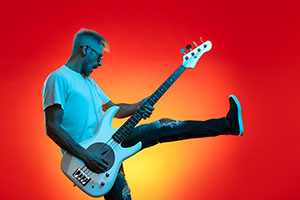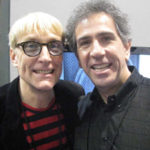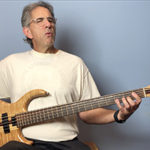“Hey, it doesn’t hurt when I do that. Far out!”
By Jon Liebman
July 29, 2022
Have you ever experienced pain while playing the bass? Maybe it’s in your hand or your wrist, or somewhere else…?
You always thought playing the bass was supposed to be fun. It’s not supposed to hurt.
Well, you’re right!
I had a phenomenal conversation recently with Dr. Randall Kertz, published as this week’s FBPO interview. Dr. Kertz is not only a chiropractor and acupuncturist, he also happens to be a bass player. So who better to ask about how the body is affected by playing the bass?
Pain is your friend (no, really)
“Pain is your friend,” Dr. Kertz says, which caught me a little off guard, at first. “It tells you something’s wrong. Listen to it. Try to figure out what the problem is.”
As a bass player himself, Kertz knows the importance of proper bass technique. At the same time, he stresses the need for awareness of how your bass playing is affecting your body. If something hurts, he says, more often than not, there’s something you can do about it.
Someone might say, “’Hey, when I bend my wrist this way, it hurts,’” Kertz observes. “But most people don’t know they’re allowed to straighten the wrist out and still play. By pointing that out, showing them that it’s not going to change their technique, it’s going to stop it from hurting. They’re going to be able to play well and play better. (It) changes the game.”
I bet you didn’t know this…
According to Kertz, some of the greatest bass players in the world have made adjustments, usually undetectable, to the way they approach the bass.
“You’ll see that a lot in some of our favorite players,” he says. “You’ll watch somebody like Victor Wooten, you’ll watch somebody like Christian McBride. They’re doing things that you’re not aware of while they’re playing. They’re turning the instrument a little bit, they’re taking little micro breaks, dropping their hand to the side. They’re doing things that they have figured out.”
First, learn it correctly, then do what you have to do.
As someone who understands the requirements of a bass player, Kertz knows the importance of learning the fundamentals of playing the instrument, like practicing scales and modes, developing good bass technique, etc. He also underscores the importance of getting a good teacher or a guide to show you how to do those things properly (citing For Bass Players Only as a good example). With those foundational building blocks in mind, he says, there are various ways to modify your approach to the instrument without putting undue strain on your body.
Kertz says, “All the long-term players who didn’t have people to guide them in this way, our favorite players that we watch, have figured out little things to do or little tricks to do or ways to get through it, whether it means just stopping for a moment and dropping the wrist behind the instrument – you don’t see that, but it breaks up the action and gives them a little rest – or maybe turning the instrument to the side a little bit. Or maybe it’s the way that they’re holding their arm or their shoulder. There are certain things that you can do to get through it that aren’t obvious, but that they have figured out over the years.”
Remain aware, always
Again, the most important thing, according to Kertz, is awareness. “Don’t just power through,” he says. “Stop. Look at what you’re doing.”
Once you become aware of the problem, he says, there’s often a solution at hand you may have never realized existed. “The lightbulb goes off,” says Kertz, “and the proof is, ‘Hey, it doesn’t hurt when I do that. Far out!’ And everybody’s happy.”
Your turn. How about you? What kind of adjustments have you made to your hand position, finger movements, the way you hold the bass, or anything else in order to alleviate pain while playing bass? Leave a comment below and let me know. In the meantime, watch my interview with Dr. Kertz here.






Had a weekly gig some time ago where the band all sat on regular height chairs. After a few months, I started getting a tingling in my plucking hand pinkie and ring finger. I realized the electric bass resting on my leg was much higher than usual, making my wrist bend at almost 90 degrees. Google suggested it was carpal tunnel! Went to an orthopedist who confirmed my suspicion. Gave me a wrist brace with the metal rod on my palm, preventing the wrist from bending. Put it on and set about trying to find a position to play. Eventually discovered that merely *standing up* (and lowering the strap a little) put my plucking wrist almost completely straight. So now, I just plain always stand.
Incidentally, when I told the orthopod that it had been bothering me a few months, he said he’d had men (figures, right) tell him it had been like that for 5 or 10 YEARS, and it gets much harder to fix. Act NOW not later!
Great advice, Eli. Thanks for passing that along.
It’s always good to make sure that you hydrate properly before, during and after a gig.
A light touch on the fretboard and with the plucking hand helps me.
Thanks, Ted!
I learned this technique from a friend after complaining my index finger and middle finger on my right hand hurts (I play right hand bass) My friend said to try and play with the index finger and the 3rd finger. Voila ! Never had pain again, I asked my friend how he learn this fix, he said he saw Geezer Butler of Black Sabbath play that way in concert and I should give it a try : )
Here’s a cool fact, hold you hand up to your face with the palm facing you, look at your index finger and middle finger.
They are both the same length : )
I guess that would take some getting used to, but if it gets the job done, go for it! Thanks, Ronald.
Correction:
look at your index finger and 3rd finger. They are both the same length : )
I don’t know, Ronald. My third finger looks a little longer. Is it just me? 🙂